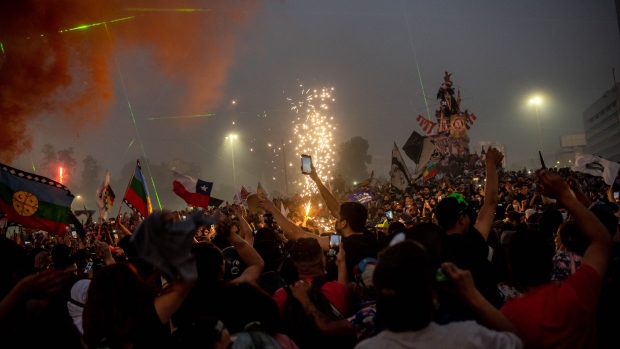Oct 25, 2020
Chile Holds Landmark Vote on New Constitution Amid Social Unrest
, Bloomberg News

(Bloomberg) -- Chileans started casting ballots Sunday in a referendum on whether to draft a new constitution, a vote born out of months of protests that rattled the foundations of a global investor darling.
Citizens will choose between writing a new charter or keeping the existing constitution that was drawn up during the Augusto Pinochet dictatorship. Voters must also decide if a newly elected assembly or a body composed of existing lawmakers and new delegates will draft the text.
The run-up to the vote has been marked by renewed protests against inequality and poor public services. Amid the demonstrations, many investors fear Chile will do away with pro-market laws they say created one of Latin America’s most stable and prosperous economies. Should voters back a new constitution, as surveys indicate they will, it will set off almost two years of debate and uncertainty before a final vote on the new charter.
“The next phase will consist of a struggle over the content of a new constitution,” said Claudio Fuentes, a political analyst at the Universidad Diego Portales. While the government opposes a new charter, it “will join in the constitutional change” once the process has started.
Polling stations will open from 8:00 a.m. to 8:00 p.m. local time, and voters will be obliged to follow strict health protocols amid the ongoing coronavirus outbreak. The country’s electoral body, known as Servel, expects the first results to come in around 9:00 p.m.
New Protests
Chile’s upheaval was sparked by a metro fare increase last October that quickly ballooned into a broader social movement with grievances ranging from pensions to healthcare and education. Lockdowns aimed at slowing the spread of the coronavirus kept a lid on tensions most of this year, though violent protests flared again this month.
Read more: Protesters Clash With Chile Police, Burn Church in Santiago
The demonstrations came as a shock to many investors and a governing class that thought the Chilean model of economic growth was widely embraced. President Sebastian Pinera initially sent in troops in efforts to quell protests before backing down and agreeing to a referendum.
Pinera, whose popularity sank to a record low amid the turmoil, has largely remained silent in recent days after calling for a violence-free vote on Monday. “We all can democratically choose the ways to change or perfect our constitution, and also confront the challenges and opportunities of the future,” he said.
©2020 Bloomberg L.P.






